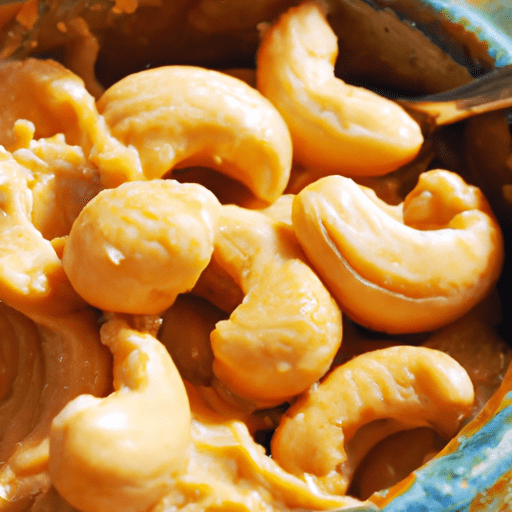Exploring the Creamy Goodness of Cashew Butter
If you’re a nut butter aficionado, chances are you’ve heard of almond butter and peanut butter. But have you ever tried cashew butter? This velvety and luscious spread is a hidden gem in the world of nut butters, offering a distinct flavor and a myriad of culinary possibilities. Join me as we delve into the exquisite world of cashew butter!
A Taste Sensation
Cashew butter boasts a wonderfully smooth and creamy texture that can instantly elevate any dish it accompanies. Its flavor is mild, slightly sweet, and nutty, making it a versatile ingredient in both sweet and savory recipes. While it may lack the intense nuttiness of peanut butter or the delicate bitterness of almond butter, its subtlety allows it to complement and enhance the flavors of other ingredients harmoniously.
Culinary Delights
Cashew butter’s versatility shines through when it comes to its uses in the kitchen. From breakfast to dinner, and everything in between, this creamy nut butter adds depth and richness to various dishes. Here are a few ways to unleash the culinary potential of cashew butter:
1. Spreads and Dips:
Spread cashew butter on toast, bagels, or rice cakes for a delightful breakfast or snack option. Its creamy consistency and delicate flavor pair perfectly with a drizzle of honey or a sprinkle of cinnamon.
For savory lovers, cashew butter can be transformed into a delicious dip by adding a blend of herbs, spices, or roasted red peppers. Serve it alongside crispy vegetable sticks or as a dip for chicken satay skewers.
2. Baking Delicacies:
Cashew butter works wonders in baked treats, lending its creamy texture and nutty taste to cookies, cakes, and energy bars. Replace traditional butters or oils with cashew butter to create moist and flavorful baked goods that leave your taste buds dancing with joy.
3. Creaminess in Curries:
When it comes to savory recipes, cashew butter shines in curries and creamy sauces. Its subtle flavor helps mellow out the heat of spices while adding richness and a velvety texture to your dishes. Whether you’re making a Thai curry or a vegan cashew cream sauce, this nut butter is a secret ingredient worth exploring.
Nutritional Powerhouse
Not only is cashew butter a delight for the taste buds, but it also packs a nutritional punch. Cashews, the main ingredient of cashew butter, provide a range of essential nutrients. They are an excellent source of healthy fats, protein, dietary fiber, and various vitamins and minerals.
While cashew butter is higher in fat compared to some nut butters, it primarily consists of heart-healthy monounsaturated fats. These fats can help reduce bad cholesterol levels and promote heart health when consumed in moderation.
Additionally, cashew butter contains beneficial minerals like magnesium, copper, and phosphorus, which are vital for bone health, energy production, and proper nerve function.
Fun Facts and History
Now, let’s dig into some interesting facts about cashew butter! Did you know that cashews are not true nuts? They are actually seeds that grow attached to the bottom of the cashew apple, a tropical fruit. This unique characteristic sets them apart from traditional tree nuts.
Originating in Brazil, cashews made their way to India and Africa during the 16th century when Portuguese explorers introduced them. Since then, cashews have become a popular ingredient in traditional cuisine worldwide, leading to the creation of cashew butter.
Final Thoughts
Cashew butter may be lesser-known compared to its counterparts, but its creamy texture, mild flavor, and versatility make it a worthy addition to any pantry. Whether you enjoy it on toast, in baked goods, or as an ingredient in savory dishes, cashew butter offers a delightful and nourishing experience like no other. So, go ahead and dive into the world of cashew butter – your taste buds will thank you!
Sure! Here are some interesting facts about cashew butter:
- Cashew butter is made from cashew nuts, which are the seeds of the cashew tree (Anacardium occidentale).
- Cashew trees are native to northeastern Brazil but are now cultivated in many tropical regions around the world.
- Cashew butter is a creamy spread with a smooth texture, similar to peanut butter but with a slightly sweet and nutty flavor.
- It is commonly used as a spread on bread, toast, or crackers, and can also be used as a dip or as an ingredient in baking and cooking.
- Cashew butter is a popular alternative to peanut butter for those with peanut allergies, as cashews are not classified as nuts but rather as seeds.
- Nutritionally, cashew butter is a good source of healthy fats, including monounsaturated fats which are beneficial for heart health.
- It is also a source of protein, fiber, vitamins, and minerals, such as magnesium, phosphorus, zinc, and vitamin E.
- Cashew butter contains less saturated fat and more unsaturated fat compared to peanut butter.
- Due to its creamy texture, cashew butter can be used as a dairy-free substitute in some recipes, such as sauces, desserts, and smoothies.
- Cashew butter has a long history, with evidence of cashews being consumed as early as 3000 BCE in Brazil.
- Portuguese explorers introduced cashew trees to many parts of the world, including India, Africa, and Southeast Asia, where cashew cultivation and production expanded.
- Cashew butter gained popularity in the United States in the late 20th century as part of the growing interest in healthier nut-based spreads and alternatives to traditional butters.
Remember that while cashew butter can be a nutritious addition to a balanced diet, it is important to consume it in moderation as it is calorie-dense.




Use the share button below if you liked it.
It makes me smile, when I see it.